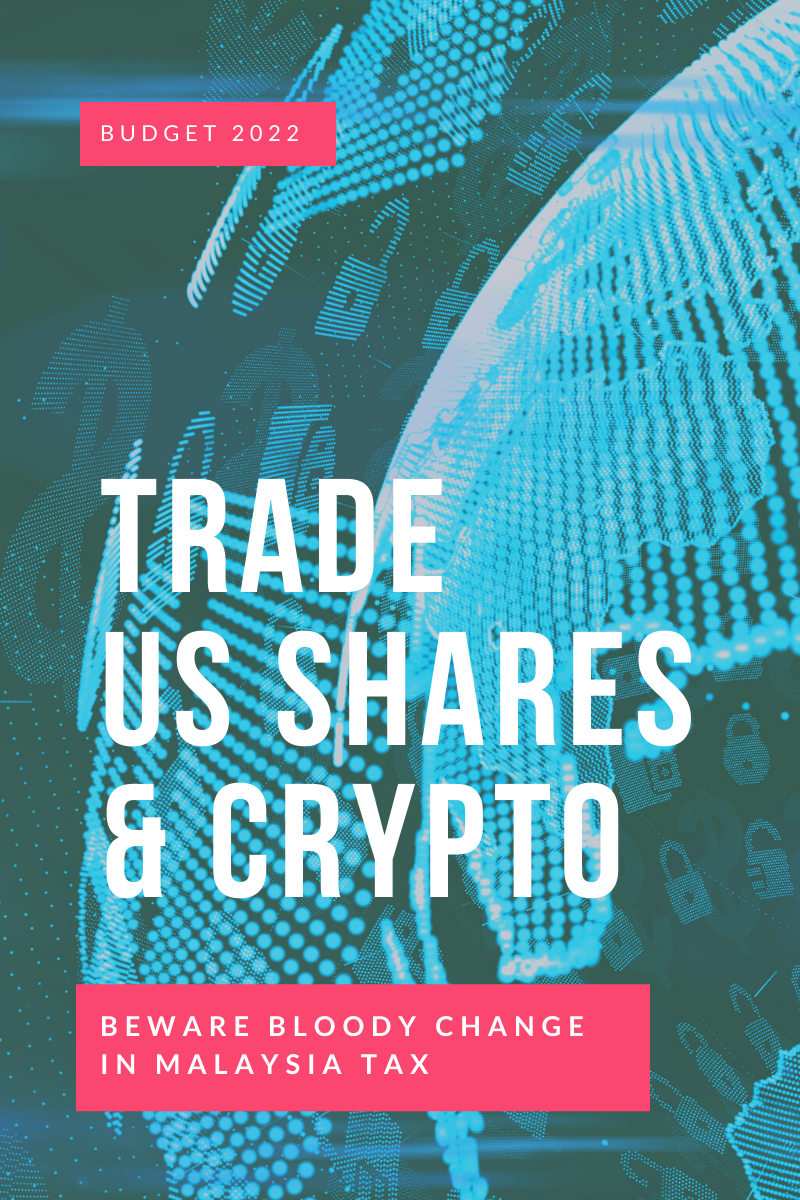
Auspicious words to Toss Prosperity This Chinese New Year! 🥢🎊
Auspicious Words and Phrases for Lou Sang (Yusheng) TossDuring the vibrant act of tossing yusheng, also known as lou sang, these auspicious phrases are chanted

Budget 2022 announcement says Foreign Sourced Income WILL BE TAXABLE in Malaysia from 2022 onwards.
Some fellow Shares and Crypto Friends were having a pound of tears after hearing Budget 2022 proposed change on foreign-sourced income.
No more tax holidays for shares and crypto profits? Malaysia government will have a stake in that US dollar you bring back into Malaysia as “foreign-sourced income”?
“2022 proposed income tax be imposed on residents in Malaysia with income derived from foreign sources and received in Malaysia from Jan 1, 2022, onwards.”
This is a significant change in our tax system.
Our tax system is predominantly territorial. All this while we rely on a special exemption commonly known as Paragraph 28, Schedule 6 Exemption.
This exemption in plain English is used to allow income you earned outside Malaysia (foreign income) brought back into Malaysia’s territory to be free from tax.
I use Australia based broker to trade some commodities, Forex and Crypto. I do it with low frequency. Setting alerts when the price certain price level I will see the charts and decide whether to enter a trade or otherwise.
My partner does day trading predominantly for forex and US Shares on daily basis. He clocked in daily at 930 pm Malaysia time. He uses Interactive Broker to trade US stocks, Pepperstone platform via MT5 for his Forex.
We maintain a minimum sum in our account. When the sum reaches the threshold, we will transfer the excess fund back into our bank account in Malaysia.
When we trade shares, crypto or commodities via a foreign broker. Most trader thinks that being territorial means, Malaysian government can’t tax on income created outside Malaysia. It has long been presumed that this will not be taxed even if we bring them back into Malaysia.
The focus was on the word “foreign-sourced”. The right focus should have been “income”. In the context of US shares,
regardless of a foreign or local source, it has to be income, then only it can be taxed.
US Shares are taxed based on country of residence.
Being Malaysian Residence we are not taxed in US for purchase and disposal of shares via US Broker. Personally, I think US shares is great because it is high liquidity and high volume. Coupled with this tax policy, it is simply irresistible.
To know whether it is taxable or otherwise, we need to first go through the aged old question of “Income vs Capital“.
It is critical to note that, Malaysian government don’t tax on a capital gain unless it is real property or shares of a real property company.
Despite at around February 2021 there were lots of rumours flying all over suspecting Malaysia will impose capital gains tax on shares.
Fortunately, ultimately it was not proposed in Budget 2022.
This is a more complex part of the story.
To fall under income tax there are two groups either :
Yup, it is a legal interpretation. It involves judgment.
In plain English, you are helping people to trade shares.
This category is mainly referring to fund managers. Their business is to receive money from investors and help them manage their brokerage account. We are not in this category.
“Trade” shares
For retail investors like us, a more technical term will be “adventure in the nature of trade”.
A “trade” involves doing work only for your benefit. So long as it is a major part of your time and wealth-building activities.
This area involves judgment and depends on facts and circumstances.
When you are in the “trade” you get to deduct expenses just like you would if you are in a business.
The charting software cost, subscription to traders’ group, stock scanner, courses, mentoring programs, the cost of purchasing the computers and that special cool table and chairs for trading.
If you don’t meet the “trade” criteria, then your expenses are investment expenses. Investment expenses are capital in nature, usually not deductible.
Four Baskets of share traders
In the retail investor’s world, there are generally four types of trading styles.
Type 1 : Long term investors
Type 2 : Swing Trading
Type 3 : Day Trader
Type 4: Auto Traders
Long term investors are the warren buffet style. Believe in the capital appreciation of shares. Buy when the shares are undervalued, hold the shares for a prolonged period. This can be weeks, months and even years. Imagine those who bought TESLA from the very beginning. :’)
Swing traders are generally trend followers. Trade the trend and can be in the trade for a matter of minutes, day or longer. As long as the trend is still right. They will remain in the trade.
Day traders prefer to look at a shorter timeframe. Usually, close out the trade within the day.
Auto Traders are the ones who rely on robot trading. The use of computer language to specify when to enter and exit trades automatically based on predefined criteria. An area I am currently studying on. It is very very interesting indeed.
Which type of traders are you?
We generally call ourselves traders. But being a trader doesn’t mean the same as “being in the trade” in a tax context.
Here’s where the tax advisor’s opinion comes into the picture. The criteria may change as new tax cases emerge.
The court cases are constantly changing the rules for stock “trade” qualification. Whether qualify for “trade” or otherwise strictly depends on facts and circumstances.
So be sure your tax advisors research these areas every year. To ensure you qualify for them.
These laws are challenging because it is not specified anywhere in the Income Tax Act. Instead, the court dictates them over the years.
So it is crucial to work with a tax advisor very closely to determine whether your facts and circumstances make you a trader or to determine what changes in your activities are needed to qualify for the “trade” tax benefits. Also, what are the documentation required to support your position?
The three key facts :
Volume means both the number of trades you make and the Dollar amount of your trades. If you trade constantly throughout the day you have a better chance of arguing than a person who trades only weekly. The amount traded have to be significant dollars too. There is no specific dollar amount that qualifies for this. Those with $1,000,000 traded will have a better chance than those who traded $10,000.
Time spent on trading activities should be a significant part of the day. The amount of time you spend trading. The more time you spend trading, the more your trading looks like your primary income activity. Whether you spend enough time to be a trader is also impacted by the third rule.
Impact on income from your trading activity must be a significant portion of your income. Is your trading income significant compared to your total income? If trading only represents 10% of your total income, it probably doesn’t matter how much time you spend trading or how many trades you make.
By definition, a trader is someone very good at trading and who makes a significant portion of their income trading.
You can’t call someone a professional bricklayer who only does the occasional project in the backyard. Nor would you call someone a professional electrician who does odd jobs for a little extra money. You will not call a person who just started trading, spending most of the time learning the trade and making lots of loss a true professional trader, will you?
Out of all the factors, time spent is the weakest. To produce the same piece, an experienced wood carving artist may require less time to produce a piece compared to a junior wood craftsman. It just needs to be enough to generate a substantial part of your wealth.
A true tradesman is someone who is a real professional, constantly working at and making money and spending serious time and effort on trading, then you will likely be considered a trader for tax purposes. You see the factors to qualify for trade is an art, not a science. There is no fixed formula or fixed measurement.
All the factors considered above are there to point to one main point which is “your has the level of skill and ability to do it so well that it resulted in substantial income”.
Our trading tax regime
The tax regime in the US is more comprehensive. Governments understand tax is a very effective regime to encourage specific trade activities. US attach special tax benefits specific to those who qualify to carry the title of traders in tax sense. There’re different tax benefits for shares, options and commodities.
In Malaysia trading is not the focal area, it is not a nurtured industry. Our tax system doesn’t tax on capital and doesn’t provide special relief for traders either. The upside is it will make things so much simpler. Not so many tax rules to check and verify. The most complex I think is in determining a trader is “in the trade” or otherwise.
Seriously if given a choice I would prefer my share trading profit to fall under capital. For the simple reason that Malaysia DO NOT TAX capital gain from shares trading (except Real property company).
Naturally, the government would want it to be taxed under income tax. Especially now that foreign-sourced income is no longer exempted. The weight is on retail traders to explain that this sum of money transferred is capital in nature and should not fall under income tax.
It is not just a battle of facts, it is a battle of evidence. The record of your trading accounts and the timing of the entries will now be of great importance. Also the ability to present your case.
There are two, million-dollar questions
First, the million-dollar question is how will they (tax authority) know I bring the money back?
Second question, how much will be taxed?
Do you love watching crime scene movies? The detective piece the puzzle up clue by clue. One lead to another. There will be some clue which is more prominent than the rest.
Taxes need to follow facts. When money is transferred from your broker straight to your Malaysia bank account. It is easy for the tax authority to be triggered and check your tax reporting later. What more if the sum is huge. Well, the currency exchange sure helped to blow things up.
It gets more difficult to trace and justify when it is transferred from your foreign bank account to your account in Malaysia.
Bank Negara’s job is to monitor the movement of money into and out of Malaysia. Bank Negara will need to document reasons for the movement of funds crossing Malaysia’s borders. Not just for the sake of taxation.
One key reason is to avoid money laundering. Unfortunately, Malaysia is one of the “highly open, upper-middle economy with exposure to a range of money laundering threats”.
Don’t think that the Bank is intentionally making our life difficult. Monitoring is important, the regulation in place to avoid white-collar and criminally driven money laundering. These are huge money.
The second million-dollar question: How much?
How big a pie will they cut? Theoretically, the government will only tax the portion you bring back into Malaysia. Yes, it is linked back to the first million-dollar question. How much you are bringing back. They are being very reasonable right? They are not taxing on the whole profit. They are taxing the portion you bring back into Malaysia.
Finance Bill says …
The recent publishing of the Finance Bill 2021 reveals foreign source income will be charge 3% on the gross sum you bring back to Malaysia. Also the period is just between January to June 2022. That’s a big relief indeed for many of the big traders in Malaysia. From July 2022 onwards it will be tax based on your tax rate.
By the way the non-residents will still enjoy exemption. Do look out for the gazetted Finance Act 2022 for confirmation.
How about the dividend income?
Taxing foreign-sourced income is a significant overhaul of our taxation system, which has been predominantly a territorial tax system. One of the key issues to address is if dividends received locally will now be taxed because the law currently exempts local dividends from income tax due to the single-tier system that Malaysia adopts. There should also be a facility to claim tax relief should the same income be subject to tax elsewhere. We discuss more on this factor in this article: An Additional Concern is on Dividend.
Disclaimer
Tax law is like Malaysia’s Weather, it can change anytime without prior notice. Do note that the purpose of this writes up is to share our view on some of the bloody tax changes from Budget 2022. It is in no way a piece of tax advice. Always consult a qualified tax consultant for tax advice.

Auspicious Words and Phrases for Lou Sang (Yusheng) TossDuring the vibrant act of tossing yusheng, also known as lou sang, these auspicious phrases are chanted

The Malaysia Standard Industrial Classification (MSIC) code plays a significant role in shaping how businesses and economic activities are understood and organized in Malaysia. But

The Malaysian government has unveiled significant initiatives to boost Carbon Capture, Utilisation, and Storage (CCUS) activities under Budget 2025. These ESG efforts underscore the nation’s

When you think of “flexible work arrangement,” does your mind immediately go to someone working from their couch with a laptop? It’s a common misconception.

Sustainability experts and ESG consultants are re-evaluating how to tackle pressing global environmental challenges. Increasingly, they are moving away from solely focusing on the Sustainable
New to Synergy TAS ?